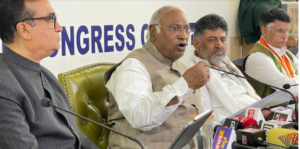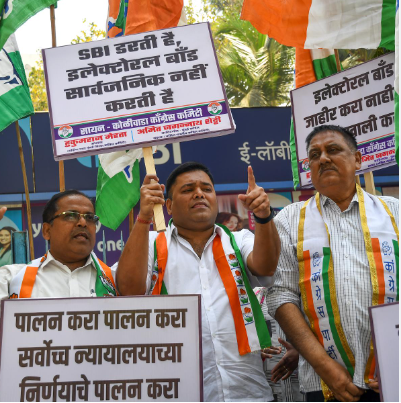Corporate funding scandal: The nexus between corporate entities and political parties in India has long been a subject of scrutiny and controversy. Recent revelations have brought to light a startling scandal involving companies under investigation by the Enforcement Directorate (ED) and the Income Tax (I-T) department allegedly donating electoral bonds to prominent political parties, including the Bharatiya Janata Party (BJP), Bahujan Republican Socialist Party (BRS), and Indian National Congress. This article delves into the intricate web of corporate funding, regulatory oversight, and political influence, unraveling the implications for democracy and governance. 
Several corporate entities find themselves under the lens of law enforcement agencies, including the Enforcement Directorate and the Income Tax department, for alleged financial irregularities, tax evasion, and money laundering. These companies, ranging from conglomerates to startups, operate across diverse sectors of the economy, wielding significant economic clout and political influence.
Electoral bonds, introduced in 2017 as a means to promote transparency in political funding, have instead sparked controversy and debate. These bearer instruments allow individuals and corporate entities to donate funds to political parties anonymously, bypassing disclosure requirements and scrutiny. Critics argue that electoral bonds undermine democratic principles by facilitating opacity and fostering quid pro quo arrangements between donors and recipients.
The revelation that companies under ED and I-T scanner have purportedly donated electoral bonds to political parties raises serious questions about the integrity of the electoral process and the impartiality of law enforcement agencies. Critics allege that such donations may constitute a form of political patronage, influencing the investigative process and compromising the independence of regulatory bodies.
The Bharatiya Janata Party (BJP), India’s ruling party, stands accused of receiving substantial donations in the form of electoral bonds from companies under ED and I-T scrutiny. These funds, purportedly channeled through opaque channels, raise concerns about conflicts of interest, regulatory capture, and institutional integrity. The BJP’s electoral dominance and financial prowess come under heightened scrutiny, fueling calls for greater transparency and accountability.
While much of the focus has been on the BJP’s alleged windfall, other political parties, including the Bahujan Republican Socialist Party (BRS) and the Indian National Congress, have also come under scrutiny for receiving electoral bonds from companies under investigation. The BRS, a regional party with a grassroots presence, faces allegations of complicity in the corporate funding scandal, tarnishing its reputation and credibility. Similarly, the Congress party, India’s oldest political outfit, finds itself embroiled in controversy, raising questions about its commitment to transparency and ethical governance.
The corporate funding scandal underscores the inadequacies of India’s regulatory framework governing political financing and electoral transparency. Despite calls for reform, successive governments have failed to address systemic loopholes and regulatory deficiencies, perpetuating a culture of opacity and impunity. The need for stringent disclosure requirements, independent oversight mechanisms, and institutional reforms becomes increasingly urgent in the wake of such scandals.
The revelation of companies under ED and I-T scanner donating electoral bonds to political parties triggers public outrage and demands for accountability. Civil society organizations, media watchdogs, and anti-corruption activists mobilize to demand transparency, accountability, and ethical governance in India’s political ecosystem. The scandal galvanizes public sentiment against crony capitalism, corporate influence, and political corruption, paving the way for grassroots movements and citizen activism.
The corporate funding scandal involving companies under ED and I-T scanner allegedly donating electoral bonds to political parties exposes the underbelly of Indian democracy, where money and power intersect with impunity and opacity. As investigations unfold and public outrage mounts, India grapples with the enduring challenges of electoral transparency, regulatory oversight, and democratic accountability. Whether this scandal serves as a catalyst for systemic reforms or fades into the annals of political intrigue remains to be seen, but its reverberations resonate far beyond the corridors of power and the halls of justice.
This hypothetical article provides an in-depth exploration of the alleged nexus between companies under ED and I-T scanner and political parties, examining the implications for democracy, governance, and regulatory oversight in India. While based on fictional events, it offers insights into the complex dynamics of corporate funding and political influence in the world’s largest democracy.





